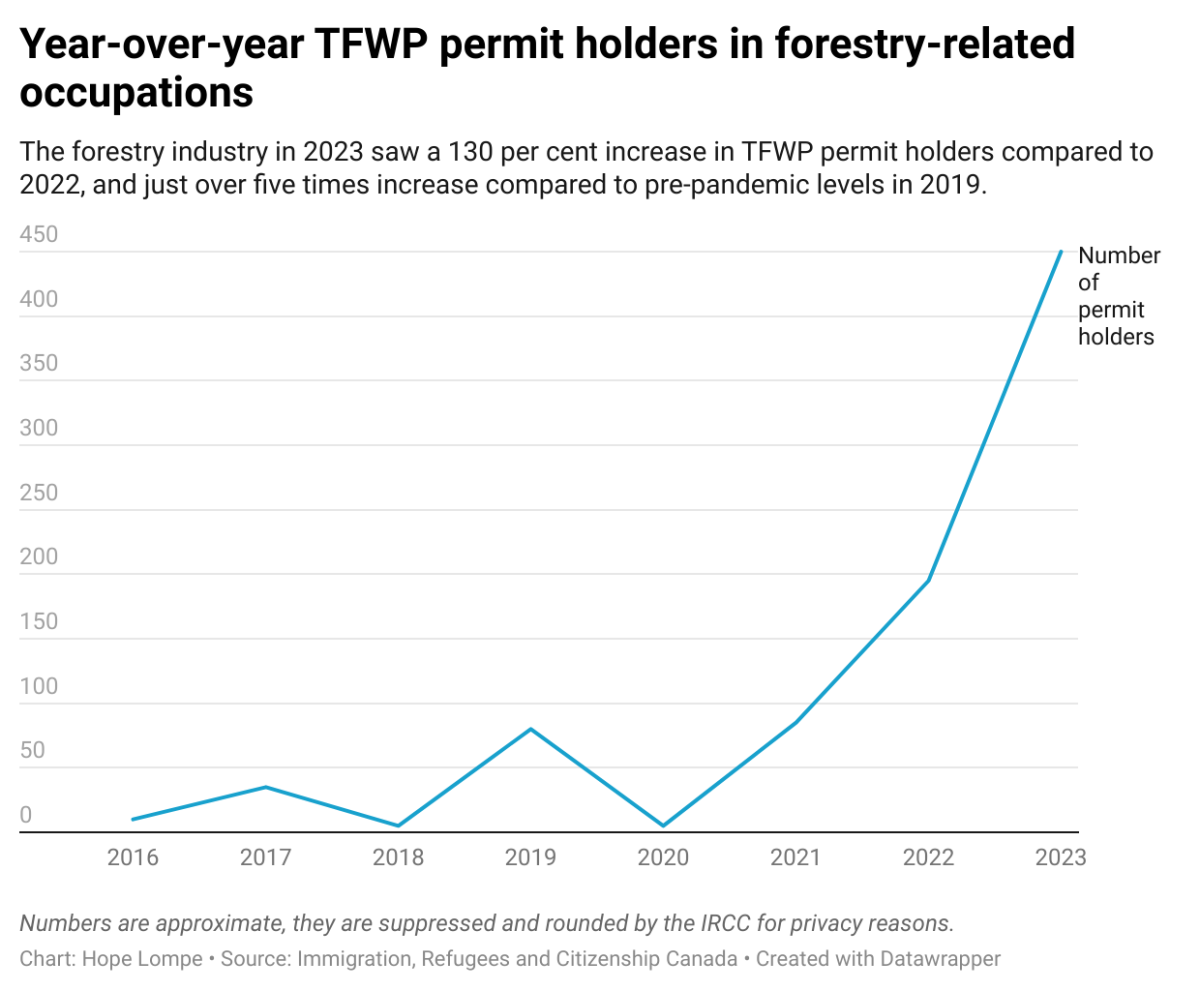Support strong Canadian climate journalism for 2025
Temporary foreign worker (TFW) permit holders are on the rise in Canada’s forestry industry, thanks to the federal government's relaxed policies for employers looking to obtain migrant worker permits in select sectors, according to an analysis of government data by Canada’s National Observer.
The disclosure comes at a time when Immigration, Refugees and Citizenship Canada is under pressure to reduce the number of temporary foreign workers after a series of politically damaging reports regarding the program.
Last month, a United Nations special report described Canada’s temporary foreign worker program as “a breeding ground for contemporary forms of slavery.” On Aug. 6, the federal government announced it will crack down on companies abusing the TFW program and impose stricter regulations.
“I’ve been clear over the last year; abuse and misuse of the TFW program must end. …We are putting more reforms in place to stop misuse and fraud from entering the Temporary Foreign Worker Program, “ said Randy Boissonnault, minister of employment, workforce development and official languages, in a release.
The steady climb in migrant workers holding permits for forestry occupations over the past three years represents more than a fivefold increase in workers who held permits through the temporary foreign worker program in 2023 over 2021, according to an analysis of Immigration, Refugees and Citizenship Canada data by Canada’s National Observer.
Quebec has taken on the lion's share of those permit holders destined for their province in forestry, with New Brunswick and British Columbia trailing behind.
Temporary workers may hold more than one permit in a year, and the IRCC says these numbers don’t necessarily reflect the number of jobs available to TFWs.

While migrant worker permit holders destined for forestry occupations in B.C. are less common than Quebec and N.B., the number of permits becoming effective for workers destined for B.C. went from none prior to 2022 to approximately 30 between 2022 and 2023.
In B.C., one forestry employer in Port Alberni made headlines in July when a series of complaints resulted in the removal of 15 Vietnamese migrant workers from “inhumane” living conditions on the San Group mill site, including lack of running water, forcing them to wash in a nearby stream. San Group is currently facing human trafficking allegations from these workers, which have not been proven in court.
Forestry still pales in comparison to the agriculture sector, which employs the largest number of TFWs, but as a result, forestry workers don’t have the same dedicated services as those in agriculture.
“There are quite a few temporary foreign workers in the logging industries, it’s just the size of that market is a lot smaller than the agricultural industry,” says Jonathon Braun, legal director of the Migrant Workers Centre.
Jeff Bromley, wood council chair with the United Steelworkers Union, says TFWs employed in forestry are unlikely to work in unionized workplaces. If they were to be unionized, they would have the same rights as any other member, he says.
“I would almost guarantee that they would be non-union,” Bromley said. The United Steelworkers Union is the largest private-sector union in North America and represents 14,000 members in Canada’s forestry industry.
“In Port Alberni with the San Group [they were] non-union… To my knowledge in the unionized sector and under our collective agreements, I am not aware of any.”
Dany Rousseau, communications director for the Quebec Federation of Forestry Co-operatives (FQCF) says the rise of TFWs in forestry could be due to unmet demand for workers — especially in Quebec, where the industry has struggled to bounce back to pre-pandemic levels.
Quebec had 87 per cent of TFW permit holders destined for their province for forestry occupations in 2023, with approximately 390, compared to about 40 destined for the second-highest province, N.B.
Since 2021, Quebec has had a temporary agreement with the federal government, allowing employers to bypass a requirement proving they tried to hire a Canadian citizen or permanent resident before offering the job to a TFW. The agreement applies to logging and forestry labourers, as well as wood, pulp and paper processing, and is in effect until February 2025.
Rousseau says the FQCF first noticed a jump in 2022, when 60 temporary foreign workers joined its membership, which represents 31 forestry cooperatives.
“That's something that you wouldn't see. There were very few before. It's since the pandemic mostly, there's been a major issue about finding workers so… they turn to foreign countries because they couldn't find [domestic] workers to do all the jobs,” Rousseau said.

Rousseau adds many workers are employed in tree nurseries because they fall under agriculture, which makes immigration pathways easier. John Betts with the B.C. Forest Safety Council says TWFs also appear to be working in tree nurseries in that province.
In Quebec, nurseries fall under the temporary agreement, as well as Canada’s three-year Recognized Employer Pilot, which allows exemplary employers in the TFW program to reduce the burden of the administrative process required to hire.
The pilot included nurseries at launch, but was expanded in a second and final stage in January to include logging and forestry, as well as wood, pulp and paper processing.
Anelyse Weiler, associate professor of sociology at the University of Victoria, worries policies such as the Recognized Employer Pilot will worsen the power dynamics between employers and workers that already exist in the migrant worker program.
“There's a lot of concern that this might reduce scrutiny of employers… who are engaging in different kinds of abuse,” Weiler said, referring to abuses like excessive work hours, unpaid overtime and workers being forced to pay back wages. “There's a lot of concern about this move toward making the temporary foreign worker program even more employer friendly.”
The B.C. government also declined to comment on migrant workers' contribution to its logging workforce, and referred Canada’s National Observer request for comments to the federal government. The TFW program is federally administered in Canada, however, provinces do administer health care and can have province-specific worker safety and protections regulations.
In B.C., the Temporary Foreign Worker Protection Act requires employers to apply for a certificate that confirms compliance with the province’s labour laws prior to applying to the federal TFW program, a B.C. Ministry of Labour spokesperson wrote in an email to Canada’s National Observer.
The federal-provincial sharing of some areas of TFW jurisdiction constitutes a “hot potato” issue for the country, Weiler says.
She adds there is a “highly problematic” lack of coordination across the country, as shown in a May Senate report identifying Canada's need for a commission to oversee employment conditions for migrant workers.
“This leadership is needed at the federal level to make sure that workers, whether they ended up in New Brunswick in the forestry industry or British Columbia, have their needs respected and that they can access the rights that they supposedly have on paper in practice,” Weiler said.






Comments
Hilarious to read the minister's "this must stop" talk right after Moscrop's piece on how they'd just heavily expanded the program.
The way I read the article, the Minister made the announcement you reference on Aug. 6, about 8 days prior to this article.
And clearly the program was expanded much before (data in the accompanying graph is for three years prior) hence the available statistics and resulting assessments that were able to be made.
All that said, industries must not be given such a free rein to influence governance policy and the Liberals should have foresaw the potential for abuse of the program and caught it and rectified it sooner.
So now the CPC who simultaneously are all about cutting red tape ie. deregulation for industry, while simultaneously demonstrating they are quite willing to play the anti-foreigner, nationalist card, will if handed power check the latter box because it is congruent with their blame game. Once enshrined in cozy majority rule, they will turn around and be themselves (surprise) and cater to the whims of industry, including foreign worser quotas for cheaper labour. What is worse IMHO will be their axing environmental reviews as they have promised and pollution standards as we know full well they will.
Each time that I read such reportage, it strengthens my belief that the mythical, supposedly enlightened beast we present to the world as Canada is enduring a prolonged, though sadly deserved, death by a thousand, self-inflicted cuts.
Of course, we must await the results of yet another investigation before arriving at a conclusion, but it’s always the right time to reinforce our understanding of what makes a “good Canadian” (see the referenced CHEK-TV report).
Are we, as Canadians, truly willing to stoop to effective slavery to facilitate our retirements and other aspects of our “just society “? Do we thus represent, if incipiently, the type of society fictionalized in the book/ movie “Snowpiercer”?
Good report.